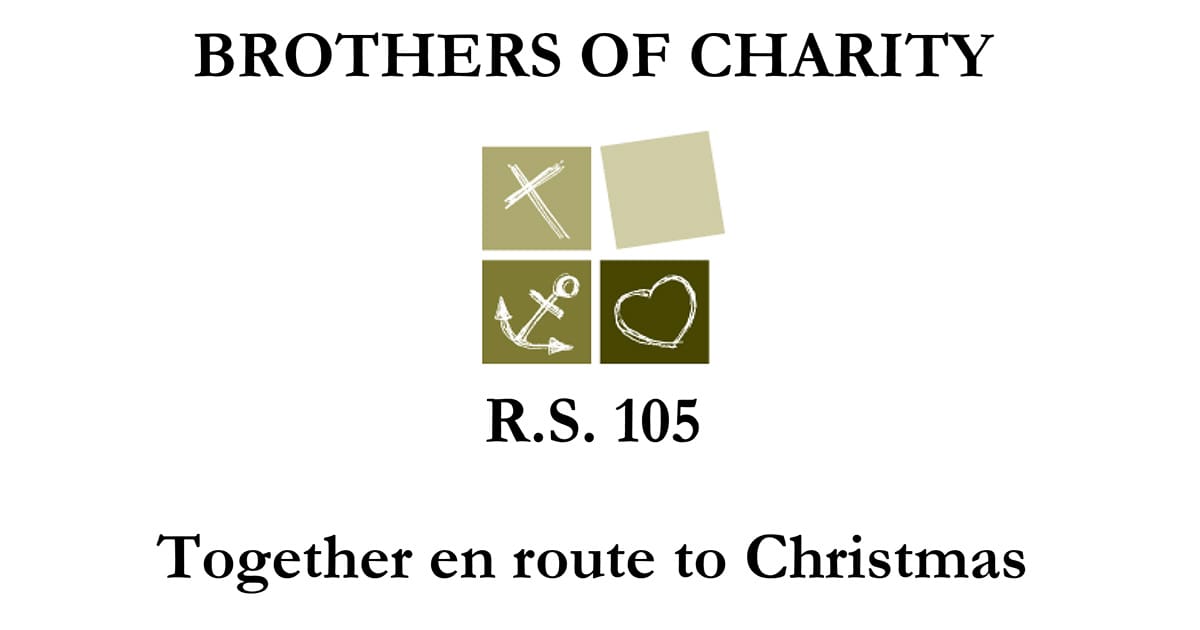As reflection on the civil year that is coming to a close and on the new liturgical year that is about to begin, Bro. René Stockman has written an Advent Letter to his Brothers, Associate Members and Collaborators in the Apostolate:
Rome, 1 December 2021
Beloved Confreres,
Dear Associate Members,
Dear Collaborators in the Apostolate,
With the first Sunday of Advent, we have begun a new liturgical year. It is like a foretaste of the civil new year that we will be embarking on in a month’s time. The time of Advent is a time of expectation. In fact, our whole life is a time of expectation, of looking forward to something new, and when there is nothing more to expect in life, it affects the meaning of life. Fortunately, as believers, we may continue to look forward to the final destination of our lives, which will far exceed all expectations. May this remain a light, also and especially in the darkest moments of our lives.
Of course, we are all expecting that our social life will be restored and that we will not have to deal with yet another wave of the COVID pandemic. We cannot deny that the pandemic weighs on everyone and disrupts many of our normal activities. At the same time, we recognize the great suffering this disease has caused and continues to cause. Last week, I attended the General Assembly of the Superiors General in Rome, where we had a moment of prayer to remember the many victims of this pandemic, and we learned how many religious and collaborators within the apostolate had died worldwide. It also made us reflect on the enormous effort that was and is asked of the medical and nursing staff in caring for the sick and also the extra efforts of the teaching and educational staff in the support of children and young people in what are surely very difficult circumstances. Perhaps this is a moment in history when we are experiencing at first hand the need for salvation and liberation as never before. That is why in this Advent we should let the ‘Maranatha’ – ‘O Lord, come’ prayer ring out in a very special way, so that the salvation that was brought to us through the Incarnation may be repeated in the concrete reality of our time. For we always need salvation, in all circumstances of our lives.
Within the Church, expectations are high for the synodal process to which we are all invited. It is like the final chord in the programme that Pope Francis has outlined for himself as Pope, and in which he now calls on everyone to answer, with an open mind, the question of how we want to see and experience the Church today. This question also extends to the bodies within the Church, and we as a congregation can and must answer it. The question should not be asked in a vague way, of course, but always in the light of a clear reference. For the whole Church, this is the Gospel and the living Person of Jesus Christ, in line with tradition and open to the signs of the times. For the Congregation, it is also the Gospel and the living Person of Jesus Christ and the special way in which this message was translated within our charism of charity. It is a moment in our own history of the Congregation to reflect deeply on our charism and, from this charism, to allow ourselves to be questioned by the signs of the times. Are we, as a congregation, still genuinely relevant in our time, do we still fulfil a prophetic role in our practice of charity, especially among those who are totally marginalized in society because of illness, a disability, or extreme poverty, and who need to hear that they, too, are loved by God? They may receive this love through our charity as a reflection of divine love. As a congregation, we live in very different contexts throughout the world, but the question will always be whether we are dynamically faithful to our charism of charity. The question will also be whether we have not got too bogged down in structures in which there is no real life any more but which, on the contrary, have started to lead a life of their own. The question of a lasting solidarity also arises, because when we say Congregation, we are not just looking at our own region, but at the Congregation worldwide. At the same time, it is a moment to rejoice at the many beautiful and telling examples of living charity that we are privileged to witness in the efforts of brothers, associate members, and collaborators. It reminds me of the words of our beloved Founder Father Triest, who articulated his mission in the following three words: “I am to give you my example, my teaching, and my service.” He very consciously gave priority to setting an example. It is these living examples of profound charity that may continue to inspire us today to always go a step further ourselves, to live and materialize Saint Vincent’s “davantage” – always more. Thank you, dear confreres, associate members, and collaborators for the stimulating examples of charity you give us!
Last week, I attended a commemoration ceremony for Saint John Berchmans, who died in Rome just 400 years ago and who is buried in the Jesuit Church of Saint Ignatius. What can we expect from a young man who died at the age of 22, was beatified and canonized after 200 years, and lived in a completely different time and culture? What can we learn from his pursuit of holiness, which permeated his entire brief lifespan? John Berchmans is not unknown in the Congregation, because, as a Fleming, he is the patron saint of young students and departments were named after him within our institutes. His life and striving for holiness can be summarized in a short slogan: “Let us do ordinary things in an extraordinary way.” Actually, it is about accepting everything we experience every day as an invitation to see God’s Will in it and to follow God’s Will in a joyful way. For John Berchmans was nicknamed ‘Frater Hilaris’ in his community – the cheerful confrere, the funny one, even. When we read his biography, we encounter many period-specific elements, but the basic attitude that he lived and exuded transcends time and culture. We also recognize the spirituality of Saint Therese of Lisieux, who went her little way to see every moment, every event, and every encounter as an invitation to sanctify her life. It is striking that both saints died very young and had no special mystical experiences during their lives, but discovered that holiness is for everyone and that the way to it is to be found in everyday life, in the terrible reality of every day, as someone called it. The philosopher Levinas will add to this by saying that we are called to perform small acts of kindness every day. It brings me back to the times we are living in, of which we do not know how they will evolve. But what we have in our hands is every day that we are given, where we are invited to do small acts of kindness and thereby build our path to holiness in joy and gladness. Let us all become a little ‘hilaris’, for ourselves and for others!
Dearly beloved, on the threshold of a new year, I wish you courage and confidence. Courage to face the daily perils we encounter as challenges and not to let them overwhelm or discourage us. Confidence that we are not alone. Is it not the strength of a religious community to know that we can turn to each other to share our joys and sorrows? May this also be the case in families and work communities. But as believers we may also and above all draw our confidence from the conviction that we are carried by God and that we can always turn to him. He never abandons us, even when we are sometimes abandoned by people or disappointed by others. Let us therefore develop this culture of prayer, individually and as a community, in which the space may grow to enter into a real relationship of friendship with the Lord. And we know that we can always turn to friends, in both good and bad times.
I wish you all a blessed Advent, a happy Christmas, and a peaceful New Year.
Bro. René Stockman
Superior General
Brothers of Charity.
Source: https://brothersofcharity.org/









0 Comments